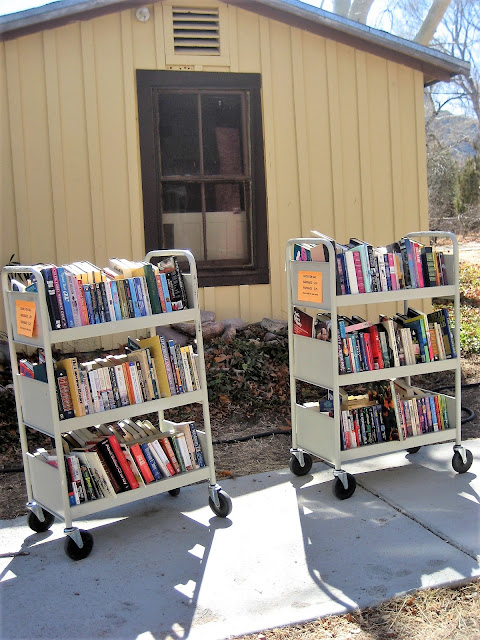 |
| Library al fresco. Portal, Arizona. March 2013. Credit: Mzuriana. |
Definitions
Geragogy:
"... is a theory which argues that older adults are sufficiently different that they warrant a separate educational theory. The term eldergogy has also been used. ... Source: Wikipedia
Critical geragogy:
"Geragogy is the method and practice of educating older adults. Historically, the principles of geragogy did not discriminate between educational programs that patronized versus programs that empowered older adults. In the former model, educators control the learning environment and old adult learners take a passive position. ....in the framework of critical geragogy, ... the older adult learner is in control of their learning and their unique learning needs are recognized and met. In practice, critical geragogy requires older adults to evaluate their experiences with education and advocate for changes that would better fit their needs." [Emphasis added.] Source: Critical Geragogy in Long-Term Care Settings
Contrast geragogy with:
- Pedagogy, which is, of course, our catch-all term for the method and practice of teaching, although the prefix "ped" refers to children.
- Androgogy, a term new to me, which refers to adult education.
Geragogy programs or movements
1. U3A aka University of the Third Age [specific to the UK]:
"... [is] a UK-wide movement of locally-run interest groups that provide a wide range of opportunities to come together to learn for fun. Members explore new ideas, skills and activities together. .... membership ... is open to everyone who’s no longer in full-time work."
Note: "No longer in ... work" seems to be a contrivance to describe those who are retired or being of retirement age, as clearly the "third age" refers to folks who are older. Maybe there's a legal reason for the program to be coy about the target age of its members. To me, it sounds similar to being "no longer in harness," as one might refer to draft horses.
Per Wikipedia, on the University of the Third Age [general]:
There is no universally accepted model for the U3A. Its original conception in France as an extramural university activity was significantly modified in the United Kingdom where it was recognized that most people of retirement age have something to contribute and the emphasis has been on sharing, without formal educational links.
Many English-speaking countries have followed this geragogic model, whereas continental European countries have mostly followed the French model. For historical reasons, lifelong learning institute is the term used in the United States for organizations that are similar to U3A groups.
2. Osher Lifelong Learning Institute (OLLI)
OLLI seems in alignment with the French model of U3A. I took courses via the OLLI program at the University of Texas-El Paso (UTEP) on:
- Civil Rights history
- Mexican history
- Spanish
- Geology of El Paso
All of the 125 OLLI programs in the US are affiliated with universities. The OLLI courses are separate from the regular classes at the affiliated universities.
3. Special access to regular classes at a school of higher learning
Every state has at least one college or university that offers older people access to its regular courses at low- or no cost. A list is here.
4. Road Scholar (fka Elderhostel)
For those with the financial means, Road Scholar:
".... combine travel and education to provide experiential learning opportunities featuring an extraordinary range of topics, formats and locations, in every state in the U.S., 150 countries and aboard ships on rivers and oceans worldwide."
5. More programs here
Examples of cringe-worthy, patronizing geragogy
1. Papa Pal's guidance on How to Teach Technology to Seniors
Considering that the big bucket called seniors generally begins at 65 ... let's remember that these doddering oldsters invented the internet, shall we? We've been using digital technology in the workplace for decades now. Sheesh.
The intro: "You’re never too old to learn something new, even technology. Seniors and technology aren’t as mismatched as you might imagine. Many seniors today learn how to use technology seamlessly, navigating the internet and connecting on Facebook — and even TikTok — as seamlessly as younger generations." Even TikTok! Hoo-wee! One of many reasons that youngers have fled Facebook is because there are too many old people using it.
"Many seniors worry about security and keeping their private information safe when they use the internet. In an AARP study, 85% of adults ages 50 to 64 revealed that they were concerned about their privacy and data protection while on the internet." Well, FFS. Concerns about digital security are age-neutral and entirely appropriate.
By the way, with the possible exception of two individuals, all of Papa's 15 leaders appear to be under the age of 50.
To be clear, it's not the subject matter of this article I deplore - there's new technology coming out every day, and it requires a learning curve for everyone - what I object to is the patronizing, infantilizing tone of the authors - and the lack of any pedagogical (or let's say, geragogical) research to support their guidance.
2. Brookdale's Tech Tips: 10 Tips for Teaching Technology to Seniors is a mixed bag.
Cringe-worthy: "Avoid technical words and use consistent language. Now that words like emoji and selfie have been added to Oxford Dictionary’s lexicon, tech speak is becoming a part of everyday language. ... Many tech-related terms may be unfamiliar to them. ..." Seriously? Because elders have lost the capacity to learn new vocabulary?
I guess this might be related to why grown-ass health care providers ask grown-ass elders if they have to "go potty."
Now this I like: "Seniors are used to being more knowledgeable and competent at most of their endeavors by virtue of the fact that they have more life experience. It may have been years since they were a novice at something .... " This recognizes that the student is not only an adult, but an adult with considerable knowledge, skills, and abilities.
No comments:
Post a Comment